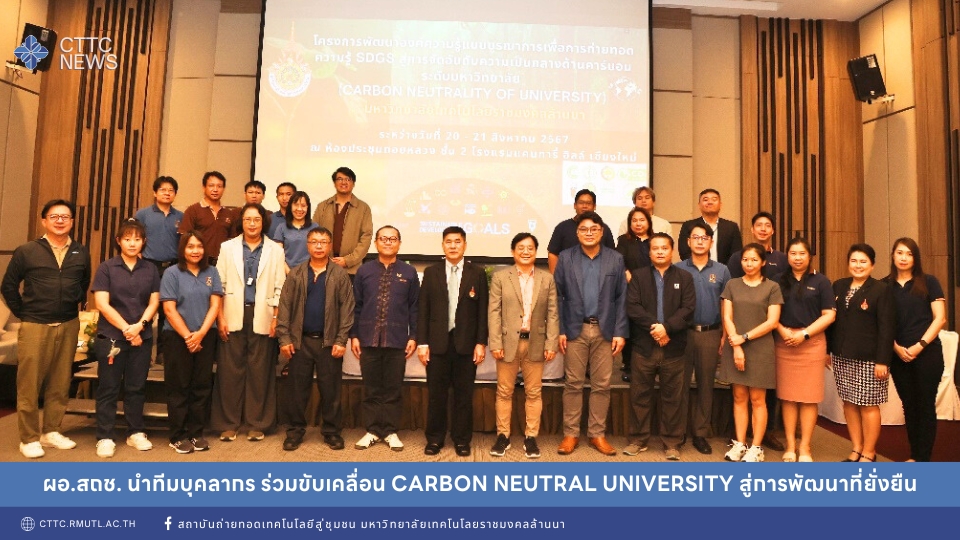Carbon Reduction and Emission-Reduction Process
RMUTL continues to take proactive steps toward achieving carbon neutrality through an integrated approach that combines institutional policy, academic innovation, and community engagement. The university’s carbon-reduction framework focuses on enhancing energy efficiency, promoting renewable energy use, and advancing low-carbon innovation both on campus and within surrounding communities.
A key initiative supporting this mission is the Integrated Knowledge Development for SDGs Dissemination toward Carbon Neutrality University Ranking (Carbon Neutral of University) project, organized on August 20–21, 2024 under RMUTL’s Transforming University Policy. The project was designed to advance SDG 7 (Affordable and Clean Energy) and SDG 13 (Climate Action) by deepening understanding of carbon and greenhouse gas (GHG) management standards, tools, and methodologies across university departments.
Participants collaborated to develop energy-management strategies for buildings and offices, promoting the transition toward green buildings and low-emission campus operations. Expert lecturers, including Dr. Pennapa Tonrungklang and Mr. Thanasak Sirichan from the Nakhonping Energy Research and Development Institute, Chiang Mai University, shared insights on energy innovation and carbon management systems, while Assoc. Prof. Dr. Pracha Yuenyongkul led workshops on stakeholder engagement to strengthen institutional collaboration in implementing RMUTL’s carbon-reduction initiatives.
This program underscores RMUTL’s leadership in building a carbon-conscious academic community, integrating sustainability into operations, research, and learning.
Academic Innovation for Carbon Reduction
RMUTL’s commitment to carbon reduction is also reflected in its educational initiatives and student achievements. On September 19, 2024, third-year architecture students from the Faculty of Fine Arts and Architecture—Ms. Jariyaporn Chatsuriyakorn, Ms. Piangnapa Buntan, and Mr. Apirak Saikham—under the guidance of Ms. Supawan Pandi, received an honorable mention in the Energy-Efficient House Design Competition organized by the Home Builder Association at the Home Builder and Materials Expo 2024, IMPACT Muang Thong Thani.
Their design emphasized passive design strategies, renewable energy utilization, and environmentally friendly materials, reflecting the principles of low-carbon architecture and sustainable building design. This recognition not only demonstrates how RMUTL fosters academic excellence and innovation in sustainable design but also supports the university’s contribution to Thailand’s Bio-Circular-Green (BCG) Economy Model, which promotes environmentally responsible growth and energy-efficient construction.
Community-Based Low-Carbon Innovation
Extending beyond campus operations, RMUTL actively supports low-carbon community development through applied research and outreach initiatives. In 2024, the university launched the Low Carbon Tourism: Waste Management for Highland Tourism Start-ups project in Chiang Rai, aligning with Thailand’s goals for low-carbon innovation and green entrepreneurship.
This project focuses on developing community-based tourism models that integrate effective waste management systems and sustainable business practices. By applying appropriate innovations and technologies, the initiative empowers local entrepreneurs and small tourism operators to establish eco-friendly accommodations, green schools, and waste-conscious tourism services that minimize environmental impact.
The project employs a participatory management approach (Public/Private/People/Partnership – 4P) and applies the ARC framework (Adjust, Reduce, Change) to inspire behavioral transformation among community members and tourists. This model enhances environmental awareness, reduces waste generation, and fosters the creation of low-carbon communities that support Thailand’s transition toward a sustainable and climate-resilient economy.
Together, these initiatives illustrate RMUTL’s holistic approach to carbon reduction and emission management—combining policy, education, and community innovation to drive the university’s transformation into a carbon-neutral institution that contributes meaningfully to local and national sustainable development goals.
Sources:
- Integrated Knowledge Development for SDGs Dissemination toward Carbon Neutrality University Ranking (Aug 20–21, 2024). Rajamangala University of Technology Lanna.
- Energy-Efficient House Design Competition: “Energy Efficiency – Concept and Application” (Sep 19, 2024). RMUTL Faculty of Fine Arts and Architecture.
- Low Carbon Tourism: Waste Management for Highland Tourism Start-ups (2024). RMUTL SDGs Portal.
- RMUTL Central News: Carbon Neutral University and Green University Initiatives (Aug–Oct 2024).

